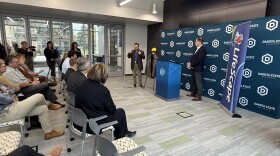-
Mines computer science professor Nirmalya Thakur’s accolades include over 120 citations of a recent research paper and the creation of an unbeatable tic-tac-toe game. Now, he wants to use the power of artificial intelligence to directly improve lives.
-
Deep underground a new shaft is being built to bring massive steel beams to a neutrino experiment at the Sanford Underground Lab. The challenge – getting tons and tons of metal nearly a mile deep into an old mine shaft.
-
A research project at the Sanford Underground Research Facility, or SURF, hits a milestone after scientists restarted the program.
-
South Dakota Mines is receiving nearly $2 million to recruit and support graduate students studying research in advanced materials.
-
The Sanford Underground Research Facility, or SURF, is hosting the 17th annual Neutrino Day in Lead on Saturday. The citywide festival includes science activities, cultural performances and talks with SURF scientists and engineers.
-
A mile under the Black Hills, science is happening with the potential to change humanity’s understanding of the universe and our place within it. At the Sanford Underground Research Facility – or SURF – any number of these experiments can have ramifications that go well beyond South Dakota.
-
Landsat 7, the first Landsat to downlink data to the ground station in South Dakota, is officially decommissioned.SDPB had a conversation at the Earth Resources Observation and Science Center, or EROS, in Sioux Falls with two men who worked with the satellite.
-
Dakota State University received a $1 million grant from Google to host a cybersecurity clinic. Officials say the clinic is improving cybersecurity in the state and abroad.
-
Crews are outfitting massive underground caverns at the Sanford Underground Research Facility in the northern Black Hills to study neutrinos. The Long Baseline Neutrino Facility has two caverns that are 500 feet long, 92 feet high and 65 feet wide. Those caverns will host cryostats filled with 17,000 tons of liquid argon to catch one of the universe’s fundamental particles.
-
The Sanford Underground Research Facility is offering photographers a chance to capture behind-the-scenes images of the facility’s unique research.
-
Crews with the Sanford Underground Research Facility in Lead say they’ll undergo the careful process of lowering about 380 steel beams a mile underground soon. Each beam weighs about 12,800 pounds.
-
A bill prohibiting “deepfakes” – or realistic AI generated images, audio or video recordings of real people - to influence elections in South Dakota advances from committee.















